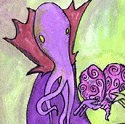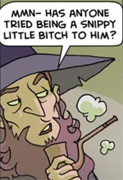|
By request, this is a thread about good NPCs with depth and how I make them. I've never written down my process before, so I'm just gonna post things as they come to mind and assume I'm talking to a new GM. I'm pretty sure a lot of this is obvious, but I have played with GMs who hosed up all of it, and you goons have linked me how-I-mine-for-NPC guides with the absolute worst advice. I have seen some poo poo. Feel free to ask questions or ask for help with NPCs you are making! You can even post a few short tips if you like.  Good NPCs Should Say Something Good NPCs should add flavour to the setting, tie into the game's themes or advance the story in an interesting way. It doesn't have to be complicated, just not generic. NPCs are the primary way many players interact with the setting, so if you can use them to reveal some cool setting fact, you should. If you have an important order of mages of something, an NPC mage can be in the order, have opinions on the order, or know something interesting about it. If they can be ported directly into another setting with no change to their story, you are potentially wasting an opportunity. If you have a specific theme, ask yourself what the NPC has to do with that theme. If your game is an examination of the conflict between good and evil, do they have any connection to that conflict? If your game is about cool friends doing ghost things, is your NPC a cool friend, or do they do ghost things? If your game has grimdark themes, why do you have bad taste? Really you don't have to think about this too hard, as long as it's not obviously jarring without good reason - if wizards are hunted down and persecuted in your game, you shouldn't have your players encounter a pointy-hatted mage who runs Ye Olde Magic Shoppe unless there's an important reason he's not affected you want to examine. If they don't do much with setting or theme and don't have an interesting purpose in the story, there's no point in adding depth. NPCs with important information, NPCs who want to kill the players, NPCs who want to give them a really soothing backrub at an inappropriate moment - all these kinds of people can be handled with one-line descriptions, but if you want me to think about them for more than a minute you are going to have to present a reason they are different to other expositionists/murderers/backrubbers. Every setting and every adventure has something unique. Take that thing and put it in your NPCs. You're The One Saying It If you make an NPC that does something stupid or lovely, then turn around and say "Well I don't like it either but that wasn't my decision", you are a loving idiot. NPCs are not autonomous things that spread their wings and fly free from the nest that is your brain once you think about them hard enough. They do not make choices on their own. There's no "I can't wait to see what they do next!". You are the one who decides what they do next. It's you. Not them. They do things because you decided they did. You. If your NPC exists to give out necessary information to the PCs but doesn't because they didn't ask in the one specific way that works, you are the one who decided that. If an NPC does something really stupid or offensive because "that's their culture!", you're the one who made up that culture. If an NPC screws the party over and ends the adventure and you would have rather seen them act differently, you should have had them act differently. If you are worried about your immersion but you can't think of another way the NPC could act that would keep you immersed, you are not interested in immersion, you are interested in being a moron. That doesn't mean characters can't do stupid or lovely things. They just can't do it unless you decide they do. Own it, you coward. If It Won't Come Up, Don't Waste Your Time All that said, there is no point to any of this if you're not going to use it. This is really more of a general thing: don't do unnecessary prep. For NPCs, if something's not going to come up, don't bother thinking about it. If you have a really cool backstory or some cool setting fact they can impart, use it or lose it. Not everything has to be deployed immediately - recurring characters don't need to reveal everything about themselves in the first session, for example - but if you find yourself telling the players "Oh, you didn't notice this, but..." after the session a lot, think about why that is, and whether it is because you are bad. Recurring NPCs Are Great Rulebook showed me a guide that said recurring NPCs are dumb, so I just want to make this clear: that is dumb and the author is dumb. Recurring NPCs are memorable. Players can connect with them, and in turn connect with your game. They also reinforce any setting fluff or themes they were meant to represent every time they show up. If people like an NPC, or having an NPC around works really well for you, there is no reason to ditch them just because you used them before. If there's a way they could fit into a later adventure, go for it! Recycling NPCs Is Great I like keeping notes on NPCs that worked really well or got a good response, so if I ever need an NPC in a hurry in another game I can just bust one of those guys out and tweak the details slightly. This also works well for PCs in games that folded before you got to do much with them, PCs from other games you liked, and characters from TV shows, games, webcomics, etc. If one of your players has seen the NPC before you should probably change the details though, unless it's a silly running joke that all these NPCs are suspiciously similar. Same goes for characters from recent or popular media, or based off Trad Games moderators.
|
|
|
|

|
| # ? Apr 27, 2024 16:13 |
|
The tip I'd add is don't lock yourself in to your own opinion of an NPC. If you have one you love but the players clearly aren't into, don't keep shoving that NPC into things. It will just make the players annoyed. On the plus side this sort of thing can be a bellwether - if the players keep rejecting NPCs who represent a particular aspect of your game, it's probably best to de-emphasize that part of your plan as well. Conversely, if the players latch onto an NPC, that's a hint too. If it's an NPC you're not terribly excited about, do something to make them fun, but don't undo what the players like about them. Especially don't do bad things to them for cheap reactions. That doesn't mean they're immune but use them for effect. And try to play up the game aspects associated with the NPCs they gravitate to. Also, if the players hate a particular NPC, you can still use them. Some of the best characters are the ones we love to hate. Just pay attention to whether they hate how the game goes when that NPC is around - whether they make the game in-fun - or if it gets a rise out of them and raises the energy level. That being said, if the party reacts in a way you really didn't expect to an NPC, don't be afraid to talk them about it. Maybe you mischaracterized something, giving them the wrong impression, or forgot to say something important about the NPC that was meant to be obvious, or maybe the players have a different perspective on the NPC that would be more interesting to explore than your original plan. Or, very occasionally, you may unearth that one of the players has a terrible opinion about something, which is useful to know, in regards to whether you want to keep playing with them, or if it's a topic to just avoid in the future.
|
|
|
|
I've done a thing now and then where, if it seems likely that a friendly NPC will join in a fight that the PCs are involved in, I won't roll for them, but instead hand a player a small sheet that lists really basic stuff like their HP, attack and damage dice, and one or two unique abilities they can use, and let them handle playing them. It'll usually be some kind of gimmick, like one guy who could create portals, and another who was a spy and could mimic anyone else's abilities (effectively letting the volunteering player be two of themselves for that fight). Naturally the encounter itself is set up to where these unique things are genuinely useful, though preferably not crucial. Mileage might vary on this, depending on how 'immersed' players prefer to be, but frankly I find it a pain to handle more than the opponents and environmental stuff during fights (and oftentimes I forget to anyway), so I like this solution when it's viable. So, I actually do have a question, sort of unrelated to that. How do you feel about fudging the dice, so to speak, in favor of opponents that are intended to be recurring? You know the old story where the PCs meet the guy intended to be the main villain but outright kill him in the very first encounter, thus ruining the GM's brilliant plan. What this involves is rather than having the opponent die, let them escape, have them go Ultimately, of course, the GM has complete control over everything and can theoretically have the bad guy do whatever the GM wants, but I fear that overdoing this, even if it was just with one particular NPC, would diminish the players' sense of victory -- while doing it right, on the other hand, could give them more reason to crave a rematch so they can deliver another well-deserved beatdown.
|
|
|
|
|
 Bonus Round! Bonus Round!  Names Are Hilarious This is less of a tip and more of a dumb habit I have because it is hilarious. I like names! Names are cool. They can have meaning. They can have double meanings. They can just be stupid puns. And since you're telling a story, you can use dumb names that would never happen in real life (and some weird poo poo happens in real life, let me tell you). Sometimes I waste more time naming an NPC than I spend making it. At this point my players look for dumb things hidden in an NPC's name as soon as they see it, even when there isn't anything. (just kidding there is always something) Here are some names I liked doing even though they were dumb. Some of them were suggested by players after I asked them which ones they remembered last night. Coeval Finlow: This dude was a gnome NPC in an old D&D game. He was kind of a mystery, at least until you noticed his name was an anagram of "I FOLLOW VECNA". Coeval had some magic boon from Vecna that erased his original identity from living memory, and relied on aliases. All of them were anagrams of I FOLLOW VECNA. Pro tip: To take NPCs with dumb anagram names to the next level, introduce other NPCs with names that only look like anagrams when people start working it out. Dr Synapse: An Eclipse Phase mad scientist who happened to look exactly like this:  Citation Needed: An Eclipse Phase AGI. Really I am mentioning this one because there is a specific method I use for naming Eclipse Phase NPCs that I would like to share with you: 1. Do one of these things: • Use Behind The Name to randomly generate names with first and last names from a different region • Use a really long science word or put a science word next to a name or a title (Professor Hemoglobin, Phenylalanine Kwan, 5-Formyltetrahydrofolate Cyclo-Ligase) • Use a noun or a phrase and pretend it is a name (Citation Needed, Takoyaki, The Wu-Tang Secret) 2. Claim this sci-fi transhuman setting means any of these names are appropriate Mikoto Mikoyama: She is a miko. Mikoto has "miko" in it and "Mikoyama" means "mountain of miko". It's really subtle. Yaburakoujinoburakouji Go: This is Japanese for "really long names are hilarious, and really long names with really short family names are also hilarious". Madoka Mawaru: Madoka can be written with kanji meaning "circle", Mawaru actually means turning/spinning/revolving, a turning circle is a wheel, and Madoka gets around in a wheelchair. Example NPCs ProfessorCirno posted:I actually am curious as to the origins of Kaiya (Dubai Flavored) and MadokaMadoka. The Terrible Lives Of Kaiya Harajuku Like years ago I was in a L5R pbp by Facts Are Useless. I decided to make an Asahina shugenja lady who was curious about everything, and while picking disadvantages I decided to also give her the gift of prophecy and a Dark Secret to make her half-ghost. (In Facts' version of the setting having a ghost dad could get you in huge trouble and maybe killed). I picked Kaiya because it sounded cool, but also Google told me it mean forgiveness and she was a little angsty about her ghost thing. Facts' game folded pretty quickly. Around a year later I recycled her for TychoBrahesNose's L5R pbp, but tweaked it a bit to make her Kaiya Ikoma. (Actually it was Kaiyada, but everyone kind of forgot about that.) I decided to keep the ghost theme, but instead of being half-ghost, I gave her the Haunted disadvantage for a different kind of ghost dad. Kaiya was killed in the first combat right before meeting up with the rest of the group. Thanks Cirno. At the time, I was setting up the anime/Cthulhu Mythos-themed NyarlathoTech games. I needed NPCs, and since Kaiya just died again, I decided to get some use out of her and recycle her as Kaiya Harajuku. This was set in a Mythos future, so I made her a hip-hop idol wizard. Harajuku is actually a district in Shibuya, Japan known for its trendy young people who dress like dorks. I even commissioned some art from awesome goon obfuscobble:  Then Ridley set up his Scorpion Emperor L5R games. I wanted to join one of them, and at the time I thought it would be funny to apply with Kaiya again. This time she became Tamori Kaiya, her ghost connection became Touch of the Spirit Realms (Gaki-do), and since in this game we were all ronin working against the Scorpion Emperor, I gave her a tragic all-my-friends-are-dead reason to defect. So now we've kind of got this thing going where every time I need an NPC to get dumped on, I use Kaiya. I needed one of the NTech NPCs to be forced to work for the Yith, and Kaiya seemed like a good fit - I was actually planning on having the players be forced to kill her, but so far they have evaded that in favour of befriending the poo poo out of her. I'll get her yet, guys. Later, when I whipped up Breakfast Cult for the October Design Contest, I recycled a bunch of NPCs for the sake of speed and made Kaiya Shibuya. I used her in the Breakfast Cult pbp, and she has mostly advanced the plot by having accidents or getting roughed up. I am not a fan of NPCs who get dumped on for laughs unless they get a payoff at the end, so one or more of these Kaiyas will have a happy ending. Until then, it sucks to be her. Madoka Madoka This is actually a thing I have done before! Some names also work as surnames, and nobody would actually be named like that, but it's fun to say. Also, "Madoka" written as a surname means "circle", so Madoka Madoka is a circular name. HA HA HA Besides that, Madoka's purpose is pretty simple - I needed someone in NTech who straight-up couldn't handle all this Mythos bullshit, but could be forged into a strong ally if the players wanted. With that in mind, I tried to make someone who they wouldn't hate, that also wouldn't come off as being forced on them so they could decide not to help her if they wanted. Madoka became friendly but shy. Every major NPC in NTech has a "Passion", something they are really good at (I like Danganronpa, okay), and I thought it would be great if someone's Passion were Dubstep, so Madoka got that one. Also, I have a Madoka in another game, so when I need to differentiate between them I call this one Madoka^2. PublicOpinion drew some sweet art for me:  Right now the PCs are calling her in to blast byakhee with her dubstep gun so I figure that NPC was a success. If anyone wants to ask about another NPC/name go nuts. 
|
|
|
|
Mazed posted:So, I actually do have a question, sort of unrelated to that. How do you feel about fudging the dice, so to speak, in favor of opponents that are intended to be recurring? You know the old story where the PCs meet the guy intended to be the main villain but outright kill him in the very first encounter, thus ruining the GM's brilliant plan. What this involves is rather than having the opponent die, let them escape, have them go I don't really GM at all so take this for what it's worth. If you put an antagonist NPC in the crosshairs of the players and then put that NPC in a position where the PCs can murder the poo poo out of him, you need to be completely open to the likelihood that your NPC is going to get the poo poo murdered out of him and plan accordingly. Okay, let me back up. The "fudging the dice" question is up to you and your group, really. If they're cool with you doing stuff like that then you should just watch yourself to make sure you aren't leaning too heavily on it because even a group that's cool with some dice fudging is probably going to get sick of an unkillable NPC. But the group you're playing with is going to make the biggest difference here, if you have a group of players who think recurring antagonists they get to fight multiple times is rad then they'll work with you to make that happen, if they prefer to take no prisoners then you need to keep that in mind when planning your games. Anyway, the problem with having a scenario where some bad guy gets beat up by the players but manages a clever escape so he can continue to be a thorn in their side is that most RPGs eschew any sort of narrative/dramatic/whatever you want to call it provisions for stuff like that. Basically what works out okay (but can still be cliched and contrived) in a story or a movie tends not to work in RPGs because a lot of RPGs are stuck in a "everyone fights until one side is completely annihilated" mindset. Which means that if you really want to do something like this then you're probably going to make some stuff up and see if the players are cool with it. Of course the obvious solution is "don't put the NPC in a position where he can get easily murdered if that's going to ruin your evil plan." NPCs don't have to conveniently leave themselves murderable if that would be bad for their plans and they should probably take some basic steps to avoid that anyway. But if you really, really want the PCs to fight Lord Darkbad and have him escape so they can fight him again, here are some suggestions: 1). FATE (and some similar games) actually does systemize this sort of thing in the form of concessions and compels. Essentially, as the GM you can do things like say that Lord Darkbad manages to make his escape, and the players get something (generally Fate Points or the like) to make up for it. This sort of dynamic seems like you should be able to adapt it to other games without too much hassle. 2). As the GM, you can pull any contrivance out of your rear end to let an NPC escape being murdered. Put a little thought into how Lord Darkbad is going to make his daring escape instead of just winging it, though, and you can play it into a plot hook. The teleporation amulet he uses is unique to this mage order, are they in league with him? You follow his escape glider into the nation of Over Yonder, which is having some troubles of its own, are they related to Lord Darkbad's plans? Etc. In other words don't just slam the door in the players' faces. Also don't rely on the players developing an all-consuming grudge against the NPC just because he escaped, they may honestly not care that much, but another plot hook to follow gives them something to investigate if they run out of stuff to do at least. 3). If the players simply manage to straight-up murder Lord Darkbad and you feel like they earned it and don't want to take it away from them, you can always play the "he was simply an agent of a much greater evil" card but you don't get to keep doing that without the players starting to roll their eyes so maybe take that one as a gimme and then plan better next time. 4). Always remember that there are a group of PCs and only one Lord Darkbad. If you try the whole "You can either kill me or you can stop the Orphanarium from exploding! Pick one!" gambit what'll happen is the PCs will split up, half of them will use some bullshit to stop the orphans from exploding and the other half will still murder Lord Darkbad and he'll deserve it for being an idiot. It is possible to get the players to break off from a fight in favor of something else but it relies on you, the GM, knowing what your players care about, whether it's another NPC they've adopted or a town they're irrationally devoted to or something, but it's never a sure thing. 5). If you absolutely have to have Lord Darkbad interact with the PCs face to face without things immediately turning into a Benny Hill sketch with swords, go with situations where out-and-out murder is frowned upon. Yes, players will do dumb poo poo regardless, but outside of catpiss stories most players who are even half on the ball will understand that shanking a dude during the King's banquet is bad form. And if they decide to try and assassinate him in his sleep or whatever, well, "a bunch of PCs attempt to assassinate a guest of the King" is practically a self-writing adventure.
|
|
|
|
Mazed posted:So, I actually do have a question, sort of unrelated to that. How do you feel about fudging the dice, so to speak, in favor of opponents that are intended to be recurring? You know the old story where the PCs meet the guy intended to be the main villain but outright kill him in the very first encounter, thus ruining the GM's brilliant plan. What this involves is rather than having the opponent die, let them escape, have them go You can try it, but you should avoid it. Escape plans are better than deus ex machina. If you piss off the players that way you might ruin the NPC, because instead of thinking "hey, it's that recurring NPC! Cool!" when they see them again they might think "hey, remember that time the GM screwed us out of killing this guy?" I did this by mistake a few years ago - a rogue villain was fighting the party from the roof of a building, so he could tap out at any time by disappearing off the far side. I didn't communicate the layout of the battlefield well though, so some of the players assumed that actually meant it was time to gang up on him and flipped out when he was gone. So make sure your escape plan makes sense too I guess. Fate has a way of doing this baked into the system that's worth looking at. Characters who are losing a fight can concede, which lets them get away but also forces them to give their opponent something that makes the fight worth it. Also, if you win the fight and take someone out, you can decide what happens to them - if you want an NPC to be recurring, you can let them know that's an option. It's not hard to take that into other games - give the players some victory if the bad guy gets away and they're less likely to get mad. Since trying Fate I have had players in other games ask if bad guys I didn't intend to be recurring can get away too, which is nice. If it's D&D or some other setting where resurrection and undead exist, plan for that too.
|
|
|
|
Thin NPCs are perfectly fine in the right setting Some games, especially 1 shots, don't have a ton of time to develop characters. Use NPCs as obstacles. Put them in a blender and let the players hit "Mix". In a game about relationships, interactions between cliches are much more easy to latch on to than complex backstories and machinations. Why is the Dork a Drugdealer? Whay are the Slut and the Closeted Gay Guy, or the Innkeeper and the Out of Town Vigilante drinking together? Why are the mayor and Professor Exposition never seen in the same place? Your characters will speculate why. If their ideas are good, use their ideas. If they ain't, say "hmmm, maybe", scribble notes, and then use them when you need a mysterious person to set off the explosives, betray the town to goblins, or cast the tie-breaking vote in the student election.
|
|
|
|
Thanks folks! Got a better perspective now on how to handle villain survival/unexpected death. So, there's some advice I can give with total confidence on NPC portrayal: Don't be afraid to give them stupid accents. And ham it up. Players love this poo poo. If the NPC is an ogre, do hulkspeak. If the NPC is an arrogant viking swordsman, talk like Skwisgaar Skwigelf. Doesn't matter if you're a great actor, you're not in this to win an Oscar. That said, use verbal ticks (like stuttering, lisping, etc.) only sparingly. They can get kinda old. Oh yeah, also, Your game is not a brilliant original work of literature, so NPCs can be ripoffs. If you figure it would get a better reaction from the players if the shady, meddling nobleman talked like the Earl of Lemongrab, what the hell, go nuts. You're not getting this poo poo published anyway.
|
|
|
|
|
Golden Bee posted:the Slut and the Closeted Gay Guy These are both terrible NPC archetypes.
|
|
|
|
Hamming it up with antagonists is one of my favorite parts of GMing, but effective antagonists that the Players will love to hate but also fear are difficult to write for RPGs. I've found that I tend to rely on having these two kinds of baddies in almost all my games as part of the antagonist roster. They're The Traitorous Mentor and The Force of Nature. The Traitorous Mentor is an NPC that is always there to help the PCs with the support they need in terms of logistics or intelligence, they keeps the plot rolling when the PCs get stuck and prevent the game from running into BSOD scenarios. Can't find any clues to where is the McGuffin? They give you a hint to let you figure it out. PC gets themselves killed by an unlucky critical? They happen to have experimental cloning tech/ancient forbidden resurrection magic. Internal party conflict escalates and threatens to dissolve the group IC? They step in and have everyone talk things out like mature people. But as the name suggests, The Traitorous Mentor is just using the PCs. I like this type of antagonist because they let me hold the PC's hands without making it too intrusive or running into the "why isn't the mentor solving everything themselves" as well as "why doesn't the bad guy just kill them before they catch on to his plan". By the time the PCs figure things out, they will have grown to rely on this helpful individual and the betrayal will give them a much more personal stake into stopping them than saving the world alone would. The Force of Nature is instead an unbeatable monster way, way over the power level of starting PCs and they know it. Usually other NPCs talk about this antagonist in hushed tones and would rather not ever cross them. Sometimes the Force of Nature is a sleeping lion you don't want to wake up like the Tarrasque. Sometimes it is a madman that runs around butchering important people (who may or may not deserve it) like Sephiroth. Ideally it will be an entity that helps and hinders the PCs both with its actions, and doesn't really consider them more than a nuisance (if it even notices them) so the PCs know it has to be stopped but they must figure out how. I like the Force of Nature because it is a threat that I can build from the start of the game and make sure it has an impact on the PCs and the setting. Clever PCs can take advantage of it to destroy their other enemies, it makes for perfect "Oh poo poo" moments when it shows up, and finally taking down the giant monster that you've been terrified of for the majority of the game feels pretty rewarding. All this from a single NPC that doesn't even need to be able to speak. My minor antagonists tend to be more varied but I use these a lot for the big threats. I don't want to over rely on either, but so far I've been keeping things fresh and no one but me has noticed.
|
|
|
|
One specific thing I've learned the hard way is to never, ever give your NPCs multiple personalities/dissociative identities. The Jekyll/Hyde thing may work in other forms of fiction, but in RPGs, where you're doing all the voices anyways and players often don't have totally clear images of the characters, it just ... doesn't work. Here's a couple blog posts on NPC making! I have found them useful. http://www.thickets.net/toren/2013/02/24/torens-dull-obvious-tips-on-naming-characters-for-roleplaying-games-fantasy-or-otherwise/ quote:As a GM and a player, it’s important for me to choose names that are (1) memorable, (2) easy to say, and (3) add to the enjoyment of the game. Having the name evoke a feeling or idea that supports what the character is or does is an added bonus. I've used some of these tips in the full post - for instance, the players in my Pirates! game absolutely love recruiting NPCs while in port, which often leaves me scrambling for names. I got the Storygames list of names, but it's really more fun to have a theme - even if the players don't catch on to it, the theme makes it easier for me to remember. So one ship is full of people named after slightly modified spices and seasonings - Sal, Pep, Kumi (cumin), and so on. So far we've mostly talked about planning out NPCs in advance, but what about when you players decide they need to know what the barkeep is really up to? Here's an article on improv-ing NPCs: http://bankuei.wordpress.com/2014/01/12/improvising-npcs-x-but-y/ quote:X is the general gist of the character in one aspect, Y is the twist or part that stands out from it. It applies across a few categories. Just thinking about how the NPC might not match their appearance/game class/social status gets you to do a quick second pass, and can add some interesting details. Sionak fucked around with this message at 13:56 on Apr 15, 2014 |
|
|
|
Lessons I have learned: 1) Give every NPC the same amount of effort: practically none. The success stories will prove themselves. In my Ghostbusters game, Lenny Greunebaum was going to be a helpful ghost who steered the players toward catching his gone-mad companions. He wound up Lenore "Lenny" Greunebaum, the team's Slimer, entirely on the combination of their pathos (being stuck in a world they never made), unobtrusive helpfulness (she had detection abilities that greatly sped up slow scenes or picked up clues in scenes where the players preferred to banter rather than snoop), and comedy (her physical body was a mood-slime-animated mannequin substantially more terrifying than just floating around as a ghost). Another major NPC started off as a nameless police officer, who got the name Bradley when one of the players asked his name, and whose first name was revealed to be Janet for a cheap gag. Janet Bradley wound up dating Chelsea, the leader of the crew, and had a little plot going on culminating in him proposing to her in the middle of a Stay-Puft manifestation. In contrast? No major named NPC I intended to be a major NPC was major after their plot was done (other than the baby mothman). They had about the same level of description, maybe a little more for motive and background for sussing-out-identity-and-weaknesses purposes, and I had no particular attachment in keeping them around longer than the players wanted. 2) Keep the herd under control. I did the above a few too many times and wound up with an unwieldy number of recurring NPCs. While they all had their moments and I don't regret building up that many, I definitely should have given them excuses to be spread out and up to their own business so I wouldn't have to check in on them virtually every session or at the very least the start of every arc. It got to the point where I had an 8-bit ghost bat self-destruct after delivering a message because I knew the players were gonna try to adopt it. (And, in fact, hardly a second after I wrote "it then explodes into pixels" did two players both post about naming it and getting it something to do. Sorry, guys; one NPC too far. One NPC too far.) 3) NPCs can do cool stuff, but it's gotta be in helping the players do their thing better. Another Ghostbusters example: Lenny helped set up the final blast on a particularly durable enemy, but most of the fight was carried out by the players and her intrusion (briefly possessing the boss and forcing him to vent most of his gathered energy) didn't end the fight, but set up the final round. Similarly, in a Dungeon World game, an NPC the characters were suspicious of took the hit for a character about to get tongue-lashed by a Tindalos hound. This immediately changed their opinion of the guy, showing that he was a stand-up type without drawing attention away from the heroes' actions. 4) Sometimes do put in a lot of effort--but in the context of the heroes. My Trail of Cthulhu game has a central NPC, Sarah, who I designed to appeal to all of my player characters' backgrounds and interest. The nurse is her caretaker (and cousin, who nurtures a crush on her). The journalist's ex-wife is a friend of the family, and Sarah comes with a lot of mysteries for him to look into (and became the focus of his Capgras delusion when he dipped below -5 Stability). The dilettante from a decaying family sees the physical embodiment of their gradual downfall in Sarah. The honorable ex-soldier has the most ideal person to defend--his old war-buddy's daughter. She got the team together, and if she didn't get their imaginations turning, well, she could fade into the background without much effort. But the players took a shine to her, and so.... 5) Reward their investment. I proposed doling out XP for the players to spend on educating Sarah up from her meager stats, and they seized up on the idea immediately and vigorously. The nurse's player looked forward to bringing Sarah up to all of their levels so she could help out in the final adventures herself. Note that Sarah had only been in direct danger once or twice in the whole campaign and hasn't had a central role in any of them beyond gathering the crew together--they're just invested in her character, not out of a meta-game sense, but to see her arc through. If they're that invested, I intend on giving them what they want!
|
|
|
|
Counterpoint to keep the herd under control: one thing I really like doing (particularly because every NPC interacted with at all should have a name) is keep a running list of name, gender, brief description, where they can be found. The more important and signifizant the NPC, the longer their series of descriptive phases gets. This lets you naturally develop people as you can throw a previously seen NPC into a new situation, making them more interesting. I run Apocalypse world so YMMV. But it's nifty especially when you and your players are making up NPCs At prodigious rates. You never have to visit someone uninteresting, but knowing a character is out there and probably has an interesting life even if you don't know what it is yet is awesome. It really brings the world to life. Edit- and this is from the pregame; there's a ton of new stuff from the first page that hasn't made it here yet. http://forums.somethingawful.com/showthread.php?threadid=3619045&pagenumber=3&perpage=40#post427696078 Captain Foo fucked around with this message at 21:14 on Apr 15, 2014 |
|
|
|
Ettin posted:These are both terrible NPC archetypes. Unless you're playing UA and one is an avatar of the Mystic Hermaphrodite and the other is a rogue Pornomancer. Admittedly the labels conjure some less than plesant connotations, but it's all in how you execute it. I'm a big fan of keeping most NPCs vague enough that the players can fill in the details. It's enough to come up with a name for the King of Fantasy Land, and I like to let the player's actions dictate the NPC personalities. Are they deferent and obedient? He's a typical soverign monarch who is benevolent and caring, taking a personal interest in the PCs exploits and relationships. Are they brash and crass? Now he's something of a tyrant who takes his kingdom for granted and has no qualms about sending the PCs on suicide missions because he couldn't care less about their lives. Or you can flip it, so they're a dick to the nice guy and playing footsie with the evil emperor. Also, it should go without saying, but the PCs should be the star of the story. There can be NPCs that excell in one thing (smarter/stronger/richer/spell caster/ etc.) more than all the PCs combined, but there shouldn't be NPCs that are flat better than the players at everything, or else it gets really dull really fast for the players who get to watch Mary Sue solve all the problems and beat all the bad guys.
|
|
|
|
Ettin posted:So now we've kind of got this thing going where every time I need an NPC to get dumped on, I use Kaiya. I needed one of the NTech NPCs to be forced to work for the Yith, and Kaiya seemed like a good fit - I was actually planning on having the players be forced to kill her, but so far they have evaded that in favour of befriending the poo poo out of her. I'll get her yet, guys. In fairness, we did beat the crap out of (one of?) her and stole some of her blood. On topic: my favorite NPCs as a player have always been the eminently hateable archivillains. Not the sort that eat puppies for breakfast and grog.txt behavior, but the ones who are always one step ahead. It's been my experience that the best way to get this result is to play entirely fair, preferably with the same exact techniques the player characters are using, and totally transparent about rolls. Ideally your players are saying something like "if it weren't for that one dice roll" whenever the NPC's name is brought up. The problem is that playing entirely fair and transparent and still winning is hard. Is there a secret to this kind of success, or are my GMs just really good at cheating just enough to create fair-but-diabolical boss encounters or evil plans or what have you?
|
|
|
|
Another tip for quickly coming up with random Fantasy/Sci-Fi/exotic sounding names for NPCs. Take any book, and point to a random spot in the middle of a page, take the two consecutive words closest to where you're pointing and combine the last syllable of the first word with the first syllable of the second. Most of the time you'll get a name that is pronounceable but still sounds unfamiliar.
|
|
|
|
grassy gnoll posted:The problem is that playing entirely fair and transparent and still winning is hard. Is there a secret to this kind of success, or are my GMs just really good at cheating just enough to create fair-but-diabolical boss encounters or evil plans or what have you? In my experience there are two answers to this. The first is that you expand on the NPCs who survive and that the player's respond to. More than once I've kept a random bandit around as a recurring opponent and expanded his role in the story because he managed a daring escape and the players kept talking about it. In this case, you can pretty reliably get that-one-guy in every campaign by backing your way into the position. In fact, once an NPC survives two or three encounters and turns up like a bad penny, you can pull much more absurd escapes with that character, since the players start expecting it. Then it's not you, the DM (even though it is), it's that one rear end in a top hat. The second is that if you know the rules well enough, its easy to fudge in that one contingency that would get someone out of a mess on the fly. If you've got enough knowledge of the game and its rules, you can pull this out of your rear end without - dare I say it? - breaking verisimilitude. There's a cheat I've used on genius or hyper-prepared villains, but only sparingly - basically, giving them one or two uses of "they would have thought of that" and then using it to pull their asses out of a fire. Its workable if you can limit yourself to things that you really would have thought of with more prep time, or a clearer understanding of the party's capabilities, and if you ruthlessly follow the rules of the thing you're using. That's hard to do properly, and I personally don't use it much anymore - in part because I pretty much exclusively run games with built in narrative ways out, like PbtA and FATE games. One of the reasons I don't play D&D much anymore is that more than once I've used this system mastery approach and it felt like cheating, because so many of them are frankly broken "push button to win" options that suck the fun out of a session. In fact, I've found the much more bald, narrative approach of "this guy gets to escape because he has plot immunity, but I will shower you in game tokens to make up for it" actually frustrates players less than having a legitimate, "see it's on his character sheet" escape clause from older style RPGs. Comrade Gorbash fucked around with this message at 01:00 on Apr 16, 2014 |
|
|
|
Comrade Gorbash posted:One of the reasons I don't play D&D much anymore is that more than once I've used this system mastery approach and it felt like cheating, because so many of them are frankly broken "push button to win" options that suck the fun out of a session. In fact, I've found the much more bald, narrative approach of "this guy gets to escape because he has plot immunity, but I will shower you in game tokens to make up for it" actually frustrates players less than having a legitimate, "see it's on his character sheet" escape clause from older style RPGs. I agree with this, but I think it's important to allow the anticlimatic solution occur occasionally. It can still be fun and memorable if the players roll their Rube Goldberg combo in from offstage and completely crush their opponent in one fell swoop. Letting every big fight drag on dramatically can get repetitive and predictable.
|
|
|
grassy gnoll posted:The problem is that playing entirely fair and transparent and still winning is hard. Is there a secret to this kind of success, or are my GMs just really good at cheating just enough to create fair-but-diabolical boss encounters or evil plans or what have you? One of the meanest things I ever did was have a villain invite the PC to a dinner party at his parents' house. That is a conflict scenario with no successful outcomes.
|
|
|
|
|
Atlatl posted:I agree with this, but I think it's important to allow the anticlimatic solution occur occasionally. It can still be fun and memorable if the players roll their Rube Goldberg combo in from offstage and completely crush their opponent in one fell swoop. Letting every big fight drag on dramatically can get repetitive and predictable. Absolutely. I'm a big believer in letting the PCs trounce the opposition now and then. It lets them feel awesome - because they are awesome. I hate it when GMs can't let a party have a clear, pure win now and then.
|
|
|
|
Ettin posted:These are both terrible NPC archetypes. That's the genre of Monsterhearts though. Reputations are extremely narrow and archetypes are broadly drawn, just like the source fiction. It's only when the PCs get involved that people gain depth (and usually in response to the NPCS). Most games don't have the GM represent an entire ecosystem of selfish scared people who feel differently about every PC, and in those you should obviously use less Arch archetypes. They're also easier to subvert. Closeted gay guy is actually hiding a monster-hunting pact; "Slutty" girl is vampire queen and has to be alone with plenty of people, etc.
|
|
|
|
homeless poster posted:Unless you're playing UA and one is an avatar of the Mystic Hermaphrodite and the other is a rogue Pornomancer. Admittedly the labels conjure some less than plesant connotations, but it's all in how you execute it. Golden Bee posted:That's the genre of Monsterhearts though. If your examples need specific cases to not sound skeevy write them better. Old Kentucky Shark posted:One of the meanest things I ever did was have a villain invite the PC to a dinner party at his parents' house. That is a conflict scenario with no successful outcomes. Stealing this.
|
|
|
|
Golden Bee posted:That's the genre of Monsterhearts though. Reputations are extremely narrow and archetypes are broadly drawn, just like the source fiction. It's only when the PCs get involved that people gain depth (and usually in response to the NPCS). However, Monsterhearts is, well, Monsterhearts. Its main draw is exploring sexual/gender identity through the veil of teen monster flicks. It's a niche, and very narrow. And frankly, MH prides itself not just as a "queer" metaphor, but a chance to revel in how poorly written that poo poo can be. Monsterhearts is a B-movie. Do you really want to write B-movie "sex on my sleeve" characters? People are not defined by what their genitalia are most satisfied by. Though if you want to write people that have a character trait that involves their gender/sexual identity, you can still do that. It just shouldn't be the main focus, because in a perfect world none of that should matter to your PCs. "This character is gender-queer." "Alright. Can they wield an axe?" Love is love, sex is sex, and neither of those are High Concepts. Real people have careers and dreams, personalities, ways of speaking, their own ways of solving problems. They don't let themselves be stereotyped by gender, race, sexuality, any of that. Neither should NPCs.
|
|
|
|
Comrade Gorbash posted:The first is that you expand on the NPCs who survive and that the player's respond to. Snipping this single sentence because I think this right here is clutch advice for NPCs in general. You can't ever completely predict how the PCs are going to respond to your NPCs. You can probably make some solid educated guesses, especially if you know what makes your players tick, but even so sometimes the PCs won't develop a grudge against the villain that you thought would have them up in arms and they'll rush to adopt a character that existed in your notes as a minor bit of background color. So always keep an eye out for who your players respond to and don't respond to, and be willing to adjust things accordingly. Old Kentucky Shark posted:One of the meanest things I ever did was have a villain invite the PC to a dinner party at his parents' house. That is a conflict scenario with no successful outcomes. Ettin posted:Stealing this. Thanks OKS, no really.
|
|
|
|
So, speaking of things like Monsterhearts, does anyone have any general tips and advice on portraying romance? NPCs in relationships with other NPCs, NPCs pursuing or being pursued by PCs, and just in general bringing in an emotion that often seems underutilized in games in favor of a focus on murder-capacity. It's a topic I've struggled with a fair bit, and I'm hoping someone can help.
|
|
|
|

|
| # ? Apr 27, 2024 16:13 |
|
I'm not a particularly qualified writer, or anything, but writing romance works for me like anything else; by asking the right questions. Why is person x attracted to person y? Does person y feel the same way (or not), and why (not)? How did they first meet? What is special about either person in the other's eyes? What do they dislike? If they are in a relationship already, have they been together long? Can their relationship last? Why or why not? Generally, it requires a bit more characterization than players are sometimes willing or able to put into their characters for games like D&D, because it goes beyond the aspects needed for their character to interact with other people and/or do the murderhobo thing. Playing the hero is easy; playing a person is harder. A player character might have a family, or friends and a life outside of their adventuring - but more often than not that doesn't come up at all, because there's little room for hanging out with family and friends in the defense of the world from great evils. The if said family or friends are put in danger by said great evil. There's always exceptions, of course, but for starters, you might want to introduce a romance angle the same way. Perhaps some man or woman falls for the handsome paladin, or the puckish rogue because their life was saved, and subsequently they became interested. Or the other way around; perhaps the fighter was outwitted by the evil agent, only to have their moment of glory thanks to the aid of some clever person - and they might fall for them in the aftermath and the celebration. Some previously mundane appearing person might have the spotlight shone on them to bring out their best qualities, and thus appeal to the other party a lot more than they previously thought. Don't be afraid to use clichés if you struggle with an aspect of writing. They exist because they have worked in the past so much so that people keep falling back to them. Clichés aren't inherently bad like many people are inclined to think. They're just tools.
|
|
|


























